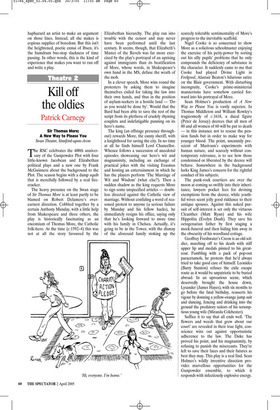Kill off the oldies
Patrick Carnegy
Sir Thomas More; A New Way to Please You Swan Theatre, Stratford-upon-Avon The RSC celebrates the 400th anniversary of the Gunpowder Plot with four little-known Jacobean and Elizabethan political plays and a new one by Frank McGuinness about the background to the Plot. The season begins with a damp squib that is mercifully followed by a real firecracker.
The heavy presence on the Swan stage of Sir Thomas More is at least partly to be blamed on Robert Delamere’s overearnest direction. Cobbled together by a certain Anthony Munday, with a little help from Shakespeare and three others, the play is historically fascinating as an encomium of Thomas More, the Catholic folk-hero. At the time (c.1592–4) this was not at all the story favoured by the Elizabethan hierarchy. The play ran into trouble with the censor and may never have been performed until the last century. It seems, though, that Elizabeth’s Master of the Revels was far more exercised by the play’s portrayal of an uprising against immigrants than its beatification of More, whose words, in Shakespeare’s own hand in the MS, defuse the wrath of the mob.
In a clever speech, More wins round the protesters by asking them to imagine themselves exiled for taking the law into their own hands, and thus in the position of asylum-seekers in a hostile land — ‘Do as you would be done by’. Would that the Bard had been able to save the rest of the script from its plethora of crudely rhyming couplets and indefatigable punning on its hero’s name.
The king (an offstage presence throughout) rewards More, the canny sheriff, with a knighthood for saving the city. In no time at all he finds himself Lord Chancellor. Whence follows a succession of anecdotal episodes showcasing our hero’s wit and magnanimity, including an exchange of practical jokes with the visiting Erasmus and hosting an entertainment in which he has the players perform ‘The Marriage of Wit and Wisdom’ (what else?). Then a sudden shadow as the king requests More to sign some unspecified articles — doubtless directed against the Catholic view of marriage. Without confiding a word of reasoned protest to anyone (a serious failure by Munday and his fellow hacks), he immediately resigns his office, saying only that he’s looking forward to more time with his family in Chelsea. Actually, it’s going to be in the Tower, with the dismay of the aforesaid family stoking up the scarcely tolerable sentimentality of More’s progress to the inevitable scaffold.
Nigel Cooke is so concerned to show More as a solicitous schoolmaster enjoying the exercise of his petty-power by sorting out his silly pupils’ problems that he only compounds the deficiency of substance in the character. It suddenly came to me that Cooke had played Divine Light in Feelgood, Alastair Beaton’s hilarious satire on the Blair government. With disturbing incongruity, Cooke’s prime-ministerial mannerisms have somehow carried forward into his portrayal of More.
Sean Holmes’s production of A New Way to Please You is vastly superior. In Thomas Middleton and William Rowley’s tragicomedy of c.1618, a ducal figure (Peter de Jersey) decrees that all men of 80 and all women of 60 will be put to death — in this instance not to rescue the pension funds but in order to make way for younger blood. The point, uncannily prescient of Marivaux’s experiments with human nature, and scarcely without contemporary relevance, is to see how those condemned or liberated by the decree will behave. Somewhere in the background lurks King James’s concern for the rightful conduct of his subjects.
The punk-rock courtiers are over the moon at coming so swiftly into their inheritance, lawyers pocket fees for devising exemptions from the decree, while youthful wives scent jolly good riddance to their antique spouses. Against this naked pursuit of self-interest is set only the virtuous Cleanthes (Matt Ryan) and his wife Hippolita (Evelyn Duah). They save his octogenarian father by first staging a mock-funeral and then hiding him away in the obscurity of his woodland cottage.
Geoffrey Freshwater’s Creon is an old soldier, marching off to his death with stiff upper lip and medals pinned to his greatcoat. Fumbling with a pack of pop-out paracetamols, he protests that he’d always tried to take good care of himself. Leonides (Barry Stanton) refuses the exile escape route as it would be unpatriotic to be buried abroad. In an uproarious scene, which deservedly brought the house down, Lysander (James Hayes), with six months to go before the fatal birthday, reasserts his vigour by donning a yellow-orange jump suit and dancing, fencing and drinking into the ground the predatory suitors of his scrumptious young wife (Miranda Colchester).
Suffice it to say that all ends well. ‘The flowers and weeds that grew about our court’ are revealed in their true light, conscience wins out against opportunistic adherence to the law. The Duke has proved his point, and his magnanimity, by refusing to punish the miscreants. They’re left to save their faces and their futures as best they may. This play is a real find. Sean Holmes’s wildly inventive direction provides marvellous opportunities for the Gunpowder ensemble, to which it responds with infectiously explosive energy.





























































 Previous page
Previous page